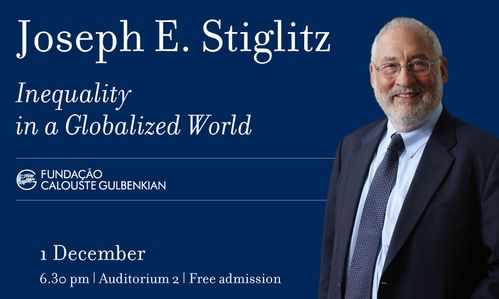Joseph Stiglitz at the Gulbenkian Foundation

The Economics Nobel laureate Joseph Stiglitz is speaking at the Gulbenkian Foundation in a conference on Inequality in a Globalised World on 1st December.
The American economist Joseph E. Stiglitz, one of the most influential authors on the issue of inequality and a leading critic of commercial and financial globalisation, one of the very few that anticipated the international crisis that unfolded in 2008, is speaking at the Gulbenkian Foundation in a conference on Inequality in a Globalised World on December 1st. The Joseph Stiglitz conference takes place in Auditorium 2, at 6.30pm, and is free entrance.
The former vice-president of the World Bank and economic consultant to the Clinton Administration, he won the Nobel Prize for Economics in 2001 for his work on analysing markets with asymmetric information levels. Stiglitz was also one of the lead authors on the Inter-governmental Panel on Climate Change (IPCC) report for which he shared the Nobel Peace prize with Al Gore in 2007. In 2011, Time magazine classified Joseph Stiglitz as among the 100 most influential figures in the world.
Born in 1943 in the city of Gary, Indiana, Joseph E. Stiglitz was awarded his PhD by MIT in 1967 and became a professor at Yale in 1970. In the same year, he was awarded the John Bates Clark Prize awarded to economists aged under 40 who had excelled in their contribution towards the study of economics. He has lectured at Princeton, Stanford, MIT and Oxford. He is currently professor at the University of Columbia in New York.
Stiglitz especially contributed towards the founding a new branch of the field, the Economics of Information, in exploring the consequences of asymmetries in information and innovatively applying core and essential concepts such as adverse selection and moral hazard, today common tools for theoretical and analytical specialists. His work has demonstrated how certain circumstances prevent markets from functioning and where selective interventions by governments may improve their performance.
Ever since the 1960s, Stiglitz has written about the economic inequalities in American society. He has dozens of works published on inequality and globalisation with the most recent The Great Divide: Unequal Societies and What We Can Do About Them (2015) in which Stiglitz argues that the economic inequalities of the United States of America represents one option as a cumulative result of unfair policies structured according to poor orientations. Based on examples applied in Scandinavia, Singapore and Japan, he defends in this book the raising of taxes on both corporations and the richest citizens alongside a greater level of investment in education, science and infrastructures among other solutions to attain a more prosperous and equalitarian society.
In Portugal, Stiglitz has published works including O Preço da Desigualdade (Bertrand, 2013) and Em Busca de Segurança (Bertrand, 2015), co-authored with Mary Kaldor. More recently, the book resulting from the Debate on Inequality and the Future of the Economy (Relógio d’Água) was published in Portuguese, recording the debate held in March by three of the leading lights from the economics field Paul Krugman, Joseph Stiglitz and Thomas Piketty. Among the themes raised in this debate are the origins of the 2008 financial crisis, unemployment and social inequalities, the problems of the Eurozone and European institutions as well as the development of the United States and China.
In keeping with Paul Krugman and Thomas Piketty, Stiglitz has adopted a critical view of the troika and the austerity policies adopted by the Eurozone. In the Financial Times, he joined the list of economists – including Thomas Piketty, the former Italian Prime Minister Massimo D’Alema and the North American Jamie Galbraith – who this year addressed a letter to the creditors of Greece underlining the need for both sides to make concessions. “An appeal for economic sanity and humanity” read the article’s title.
